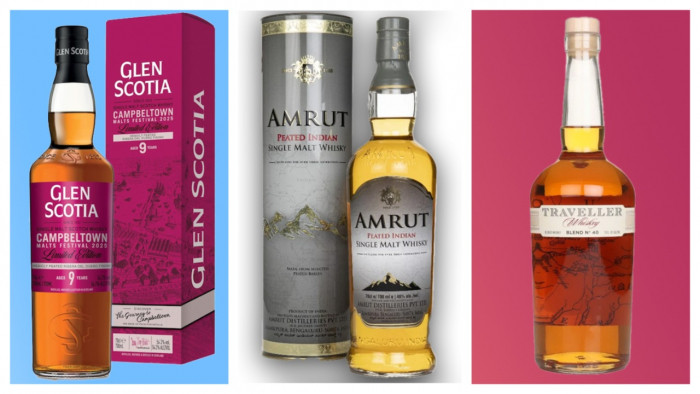Has Hollywood's Alpha Male softened? Andrew Dickens finds out
Russell Crowe walks into an executive box at St Helens Rugby League Club. “Russell,” says our mutual friend Martyn, “this is Andrew.” Hands are extended, a firm but not dickishly firm grip is made, followed shortly by sharp nods of the head.
“Hi Russell, it’s a pleasure to…”
“All right mate?”
Hands shake. Russell Crowe has gone. He’ll have an idea what that pleasure was, but he’ll never know for certain.
Crowe isn’t being dismissive; he’s on a mission to get to his seat outside the box. He’s here to watch his team (literally his – he owns 37.5 per cent of the club), the South Sydney Rabbitohs, or ‘Souths’, take on St Helens for the title of world club champions, and kick-off looms. It’s Oscars night and Crowe has chosen ice-cold Merseyside over an offer to dish out a little gold man in Los Angeles. This means a lot to him.
As do the people around him. Crowe arrived here by private helicopter (how else would Russell Crowe arrive?), bringing with him an assortment of long-term friends of a mostly non-celebrity nature.
Three of them are Englishmen he converted to Souths years ago: Martyn, a journalist who’s known Crowe for his entire career; David, his regular on-screen double; and Peter, the uncle of Crowe’s estranged wife, Danielle Spencer, great uncle to his kids, husband to a murd… no, that’s the other fella. Their loyalty and friendship is rewarded with a ring, specially commissioned by Crowe to commemorate the team’s 2014 national championship; their first in 43 years. They’re handed out before the game, without fuss.
Among the more famous – and intimidatingly large – guests are his Gladiator co-star Djimon Hounsou, a couple of rugby league players, plus ex-Souths player Sam Burgess, who has since switched codes in an effort to break into the England rugby union team. Cue a cheeky Swing Low Sweet Chariot from the Saints fans.
Mates, sport, beer, rugby players, ‘bants’, two gladiators; it’s a fairly masculine environment. But hey, this is Russell Crowe’s world; he who is perceived as cinema’s mostly manly of men. Even the show tune belted out at half time, by an excellent female vocalist, has some blokey Crowe-poking humour to it: I Dreamed A Dream from Les Misérables. I watch the game and I watch Crowe. He’s more interesting than the game, which finishes 39-0 to Souths.
In this world, Crowe is – forgive me – master and commander. Things are done his way, to his timetable. He combines superfan with superhost and superstar, taking his eye off the play only when necessary: to make sure everyone is happy, to respond to chants of “Russell, gizza wave” or when a fan wants an autograph or selfie. After the final whistle, he spends another hour outside the box signing and smiling until everyone’s got what they want. That is what he wants.
Eventually, I get what I want: an interview. We talk Souths, his career and his new film: The Water Diviner. After 25 years in film, this is the 50-year-old’s directorial debut, a moving tale of an Australian farmer (Crowe) who, in 1919, heads to Turkey in an effort to find the bodies of his three sons, who he believes died on the same day at Gallipoli.
He likes to talk. And as he does, something becomes apparent: there are words of wisdom here. He’s providing an inadvertent life guide to being a man – a successful, good man. Russell Crowe-style. He’s not preaching, I’m not asking for advice, but the lessons are there. I won’t say 10 commandments – he hasn’t played Moses yet – more like eight observations.

CHALLENGE YOURSELF
For a man with his CV, including three Best Actor nominations and a win (for Gladiator) at both the Oscars and Baftas, you’d think little in the film world would faze Crowe. But stepping up from player to coach with The Water Diviner caused some apprehension maximus. “Choosing to challenge yourself is an individual personality thing. Some people will go their whole lives without ever challenging themselves, but that’s not really me. The funny thing is, setting the film up, I wasn’t nervous at all. Then, probably 72 hours before we started shooting, I was like, ‘Oh, right. How do I do this?’ Leading up to that first day on the set, the self-doubt, the questions – it was crazy.
“I’ve got to stay cool, but internally I was really, really nervous. I always have this really easy relationship with the crew and the people I’m working with. My mates on film sets tend to be the guys who are 4ft away from me: the focus pullers, the grips. I began to think, ‘Now that I’m the boss, will that dynamic be different?’ So I became extremely nervous.
“But it’s a normal process; never at any point were any of those churning self-doubts rational. With any live performance, any kind of performance at all, I get a lot of butterflies, I get stage fright. Over the years I’ve realised that’s only because I care. If I didn’t care, I wouldn’t get that. And, in fact, the day that I’m walking off stage and I don’t feel that is the day I should stop doing this stuff.”

LEARN TO LEAD
Being the boss on The Water Diviner required some serious leadership skills. Luckily, the boss’s bosses had taught him well. He’s worked with some of the best, and brashest, directors around.
“I’ve learned about leadership over time, because guys I’ve worked with, such as Geoffrey Wright or Ridley Scott or Peter Weir, but particularly Ridley, would say, ‘You’re the head of the acting department. So the same pressure I put on the head of the camera department or head of production design, you get. If one of your men f*cks up, that’s your responsibility.’ I’m like, ‘But there’s hundreds of them!’ And he’s like, ‘Yeah, off you go.’ You learn from that.
“It probably came to a head in Master And Commander. You have to play at being the leader, of being in control. If you say something, it’s listened to and acted upon there and then. So I had a lot of conversations with naval officers and ship captains from all over the world leading up to that. For about 12 months I was travelling from boat to boat. This one guy said something that was very, very useful. He said that, when you’re the captain, your crew don’t require you to be right. In the moment, they just require you to be certain. It worked very well for me in Master And Commander, where you’ve got Peter Weir saying, ‘OK, we’ve got 600 sailors – you’re the one who makes sure they don’t go into whore houses in Tijuana. Right? Bye.’ People from that film still call me captain or sir.”

THINK BEYOND YOU
Crowe is well known for his generosity, not just to his friends, but to where he grew up: South Sydney. He’s donated to schools, set up scholarships, but his biggest investment, financially and emotionally, has been the Rabbitohs. Crowe’s very much hands-on leadership, from designing merchandise to codes of conduct (not just for players, but for board members, caterers, everyone) to getting 18-stone rugby players to draw pictures as part of a ‘creative visualisation’ process, turned Australian rugby league’s laughing stocks into, as of tonight, world champions.
“Some people get to a point of success and the last thing they want to do is reach backwards. I’m different. That’s why I took on South Sydney. I thought, “I’ve been very fortunate, what I can do that helps the community that shaped me?” I could’ve just written cheques, but taking on the responsibility of South Sydney, of restoring pride in that community… It’s a big community. You’ve got some of the poorest people in the country – dense areas of government housing, the largest urbanised aboriginal population – but also some of the most expensive real estate in the country.
“So it’s very diverse and complicated. We performed the most impossible task, to turn this perennial losing club that never has any money into this movement of people who are proud of what their club does, not just on the field but off it. We try to connect to our poorest, most disadvantaged fan in the same way we connect to the guy with the great job. You know that’s what Souths stands for. You pay your membership because it’s a club with a big heart that’s connected to its community. It’s worthy of your dollar.”
KNUCKLE DOWN
This investment has had a knock-on effect that’s a lesson in itself, not least for Crowe’s neighbours. Crowe’s work ethic is second to none, fuelled by that passion for what he does. His message: graft will get you everywhere.
“The worst thing you can do to people who are disadvantaged and struggling every day is have a team represent them that means nothing – who do nothing, who don’t fight, don’t compete. You’re telling them the wrong thing. The success of Souths breeds doctors and lawyers. What you have is a pure example in front of you: if you work hard you can pull yourself up from the worst possible situation. Not just become competitive, you can win. You can become the champions. That doesn’t mean that the kids of South Sydney all become rugby league players. Souths is a bright shining example of that simple equation. You put the work in, the positive stuff comes at the end of it. Doctors, lawyers, whatever it happens to be, there’ll be more kids from South Sydney fulfilling their dreams because they know what the equation is.”

BE A STUDENT
If we can learn a lot from Crowe, much of it has been passed down to him. He likes to talk – he really likes to talk – but he also likes to listen.
“A lot of people have been mentors to me, but that’s the thing, if you’re not a student, you’re going to miss out. You’ve got to be a student, of life, of the job. Bryan Brown was extremely important in my life, because I worked with him in my first lead role [Blood Oath]. He was a lawyer and I played his assistant. He was so free with me. I could be myself, show my sense of humour, and we got on really well. For one of the scenes, he said ‘What are you going to do in this scene?’
I said, ‘I’m walking through the bush, so I think I’ll smoke a cigarette.’ He says, ‘We’ll see how that goes.’ Twenty-seven takes later I can hardly talk and he says, ‘How do you think your choice was?’ It was a good thing to learn, that. He started this thing where he said, ‘You’re the guy I work out with, who I run with.’ Then he said, ‘You travel with me to and from the set every day, so I expect you to be outside your hotel at this time.’ So it was a great relationship. Whatever your passions are, you always have to be a student. And if you’re open like that, the teachers will be there for you.”
DO WHAT YOU LOVE
Crowe says he’s been living the dream for 25 years, but right now he must be pinching himself with a pneumatic vice. He’s acting, directing, he owns a rugbyclub and a cattle ranch. He can take his mates to games in helicopters and crowds chant his name. Making your passions your work is something he learned to do a long time ago.
“On the very last day of Blood Oath, Bryan said something to me along the lines of, ‘OK son, I’ve watched you every day. I know what you’re capable of and you’ve got a big career in front of you. I just want you to remember, as you go through it, just do it because you love it. If you wake up one morning and you’ve stopped loving this thing, then go and do something else.’ It was a very poignant moment, because that year Bryan had been in Cocktail and Gorillas In The Mist – two of the top 20 grossing films of the year – but then he never really made another film like that. His kids were of a certain age and he just changed his priorities. He started spending more time at home and less time travelling. It was poignant then, but increasingly poignant as time goes by, because it was almost like a passing of a baton.
“Richard Harris was also a big mentor for me, and he said a similar thing. He just put his metaphorical arm around me from the moment we met and, in the middle of that heavy time where being famous was uncomfortable, he helped me laugh through it and see it for what it was. He instilled in me that the things I’d been doing to that point shouldn’t change. Focus on what you’re doing. Make your decisions the same way. Ignore the big cheque and just do the things that you love and you’ll be fine.
“All my business decisions are based on passion. That’s good in the way that the things that you do are the things that you love, but it also means that there’s never a break. If you’re passionate about something, it can’t be the second tier. They all need all of your effort.“

LEARN FROM YOUR FATHER
Fatherhood is, as the story suggests, a key motif of The Water Diviner. It’s also a topic that seems to elicit tender emotion from Crowe (yes, he has them). As a father himself, he says, he felt a responsibility to tell this tale. But I get the impression that his love and respect for his own dad was equally motivating. With a softening of his eye and the slightest of cracks in his voice, he talks about his parents.
“I grew up through some difficult times. We were neither rich nor poor. My parents always put in front of us what we needed, but we never had anything. My dad had been quite successful when I was a baby in New Zealand, but then he took a big risk and moved to Australia to get into business with his father and it didn’t work out. So everything he’d earned, he lost. We didn’t actually live in a house until I was 14.
“Looking back, if I needed something, they found a way to do it. If I needed boots or money to go on a school trip, they found it. When I was a little boy, I stayed up later than I should’ve and I could hear their conversations in the kitchen. So I know we didn’t have money for anything. It was kind of scary. But my parents never let that get in our way as kids. Sure, if I wanted a bike, my dad would buy a $20 bike that was 50 years old and respray it, but I still had a bike. He went and bought a $3 cricket bat from a garage sale, got a new brightly coloured rubber grip for the handle and put linseed oil on it, and it looked fantastic. I loved that bat. He was resourceful and taught me so much by simple example.”
EMBRACE MANLINESS
So here we are, lessons from Hollywood’s Alpha Male. I mention this to him, his ‘male icon’ status and the amused contempt is clear. It doesn’t necessarily mean the line isn’t true, but he certainly doesn’t buy it.
“Yeah, funny isn’t it? You’re a tough guy! Oh come on, I put make-up on for a living! Calm the f*ck down. People are talking about something that’s just intrinsically natural to me. I don’t put any effort into that, in the same way that I don’t put any effort into my voice or the way my hair grows. It is what it is. But I do, probably more than other people, value the positive aspects of masculinity, of masculine tribalism. I don’t see, like some people do, that it always ends up in a negative. I don’t believe that. In my life, over and over again, the opposite of that is true. Teamwork among a group of men, that has a level of camaraderie and spirit to the way people talk to each other and take the p*ss out of each other, it’s a positive thing. To me it’s a beautiful thing.
“I’m not making any differences here between male and female, but in my experience, mateship and friendship and the camaraderie of a group of men all focused on one goal is very positive. I grew up playing team sports, I grew up with my dad always being the boss of a group of people that happened to be workmen. I saw his level of quiet leadership. He was never a man who had to raise his voice. But if he had to make a decision, he made that decision and it would be absolute once he made it. So I always had that example.”
The Water Diviner is at cinemas nationwide from 3 April
(Images: Rex, Kobal, PA, EntertainmentOne)
Latest
Related Reviews and Shortlists


The best whisky taste tested









